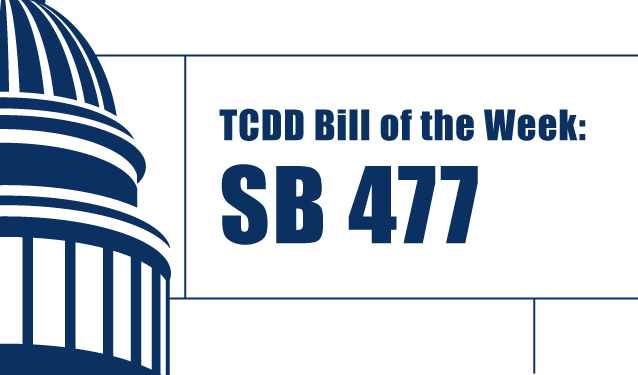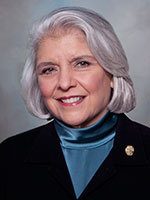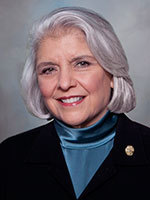SB 477
SB 477

For this weekly feature, we profile a noteworthy bill that is going through the legislative process. The bill may relate directly to TCDD’s Public Policy Priorities or another disability-related issue.
Table of Contents
Bill: Senate Bill (SB) 477, relating to accommodating voters with disabilities
Bill author: Sen. Judith Zaffirini, Senate District 21 (Laredo)
Share this bill
We’ve created a Bill of the Week one-pager (PDF) for SB 477. This is a simplified explanation of the bill that you can share with your representative and personal network.
Voting information for people with disabilities
We’ve compiled information and resources for voters with disabilities and poll workers, including a video that shares essential things to know about voting accommodations and how poll workers can support voters with disabilities. To learn more, see Voting Information.
What does the bill do?
SB 477 would change Texas election laws to improve and make uniform accommodations for voters with disabilities. The bill proposes several changes to the Texas Election Code to address issues related to mobility, parking, and accessibility for voters with disabilities.
The bill would require election officers at voting locations to give priority access to voters with disabilities that affect mobility and movement. Election officers currently have the option to do so, but SB 477 would make this a requirement. Public notice of this voting-order prioritization is currently required at one or more locations at a polling place; the bill would require such posting at each polling place entrance. Under existing law, disabilities and conditions that may qualify a voter for voting-order priority include:
- paralysis;
- lung disease;
- cardiac deficiency;
- arthritis;
- foot-related disorders;
- a severe limitation in the ability to walk due to an arthritic, neurological, or orthopedic condition;
- the inability to walk 200 feet without stopping to rest; and
- the use of a wheelchair, brace, cane, crutch, portable oxygen, or other assistive devices.
The bill would require each polling place to reserve two parking spaces for voters who are unable to enter the polling place or require assistance to do so. For this purpose, the two reserved spaces may not be parking spaces already designated specifically for persons with disabilities. Additionally, the two reserved spaces must clearly be marked with a sign indicating that they are reserved for voters who are unable to enter the polling place.
The bill would clarify that when a clerk delivers a ballot to a voter at a polling place entrance or curbside, the clerk must follow guidelines that are already in law. These guidelines include provisions relating to the marking of ballots; depositing ballots in the ballot box; and attestation forms filled out by people transporting seven or more voters to the polls at the same time.
SB 477 would require all procedures and accommodations available for voters with disabilities, including provisions related to voters who are unable to enter a polling place, to be posted in an accessible manner on the county clerk’s website.
The bill would require the secretary of state to provide a printable application to early voting clerks for early voting mail-in ballots. The application would be formatted to allow a voter to easily complete the application online before printing it out. Early voting clerks would be required to post this application or another similar application with the same accessibility features on their websites.
If passed, SB 477 would take effect on Sept. 1, 2023, or immediately if it received an affirmative vote of two-thirds in both the House and the Senate.


Statement from Sen. Judith Zaffirini, bill author:
“SB 477 would ensure persons with mobility impairments receive some minimum accommodations throughout the state so they can participate in the democratic process without undue burden.”
Where is the bill in the process?
On March 27, SB 477 received a public hearing before the Senate Committee on State Affairs. You can watch the discussion on the bill here, beginning at the 3:57:30 mark.
On March 30, the bill was favorably reported by the committee on a vote of 11-0. The bill was recommended for the Local and Uncontested Calendar and now awaits scheduling for consideration by the full Texas Senate.
Who supports the bill and why?
The following testimony was given at the March 27 hearing on SB 477:
- Texas Civil Rights Project: Veronikah Warms, the Manne family fellow for Texas Civil Rights Project (TCRP), explained how TCRP helps run a nonpartisan election protection hotline. She said the hotline receives hundreds of calls every election from voters with disabilities who face difficulties casting their ballots, including many reports of trouble accessing curbside voting. She noted that many voters in Texas are unaware that curbside voting must be offered at every polling place, adding that the lack of proper notification and instructional signage further complicates the situation. In 2020, TCRP obtained a court order requiring Bexar County to display conspicuous curbside voting signs at every polling location. Despite this effort, Warms said the problem continues throughout the state, making it challenging for voters with disabilities to exercise their right to vote. She further emphasized that clearly marking parking spots would be a simple fix to a widespread problem. “Curbside voting is a crucial aspect of disability access in Texas,” she said. “SB 477 would make sure that voters who need curbside are able to use it.”
- Coalition of Texans with Disabilities: Dennis Borel, executive director of the Coalition of Texans with Disabilities, explained how the accommodations included in SB 477 are already allowed by law, but the bill would help create “better on-site practice of accommodations [that lawmakers] have already approved.” He noted that most voters would kindly step aside and make way for individuals with mobility-related disabilities to cast their ballots, but there is a small percentage of voters who would not do so, and existing law leaves it up to poll workers to decide what is best. SB 477 would help poll workers and voters avoid unnecessary confrontations by requiring voting-order prioritization rather than keeping it optional. Borel closed by stating: “Ease of access for voting for people with disabilities is dependent on accommodations, and SB 477 makes better accommodations in practice.”
The following groups also registered their support for SB 477 but provided no testimony: AARP Texas, ACLU of Texas, Autism Society of Texas, Battleground Texas Engagement Fund, Children’s Defense Fund Texas, Disability Rights Texas, Educators in Solidarity, Girls Rock Austin, League of Women Voters of Texas, MOVE Texas Action Fund, Secure Democracy USA, Sierra Club Lone Star Chapter, Texas AFL-CIO, Texas Chapter American College of Physicians Services, Texas Council of Community Centers, Texas Impact, Travis County Democratic Party, and United Ways of Texas.
Who opposes the bill and why?
The following testimony was given at the March 27 hearing on SB 477:
- Former Elections Officer: Bill Sargent, the former chief deputy clerk for elections in Galveston County, explained how the elections office in Galveston County rejected locations that did not have adequate parking for all voters. He said if an elections office is doing its job correctly, then parking is already something it would be monitoring. He suggested that the bill’s voting-order prioritization might be provided to individuals who didn’t necessarily need it and recommended “letting the judge in the polling location look at the circumstances and use their own discretion and own judgment as to what is best to do.” Sargent also shared concern that many voters might not read the important information posted at polling locations.
The following groups also registered their opposition to SB 477 but provided no testimony: Texas First and Texas Eagle Forum.
Additional Testimony
The following testimony was given at the March 27 hearing on SB 477.
- Harris County Republican Party Ballot Security Committee: Alan Vera, the chair of the Harris County Republican Party Ballot Security Committee, noted that his organization was “in spirit, totally with this bill.” But he explained that Harris County was sued by the Department of Justice in 2018 for violations of the Americans with Disabilities Act because of inadequate accessible parking at the county’s polling locations. Vera further noted that the “very terms outlined in [SB 477] for parking are exactly in the Harris County Election Operations Manual and the training manual for every judge,” but the terms are not properly followed because some facility managers of polling locations have an intolerance toward creating parking accommodations or even allowing certain people to vote inside their buildings. Vera closed by sharing his concern that “without some reinforcing requirements, … [the parking section] of the bill is going to be honored in only some locations, not anywhere close to what you’re looking for.”
Additional information
TCDD adopted the following language among its 2023 Public Policy Priorities.
Voting Access: Ensure Texans with disabilities have equal access to voting by establishing a more accessible and timely method for signature curing, broadening the assister’s oath to better reflect the right to assistance protected under federal law, and developing an online mail-in ballot application process. Issue standardized, accessible information on the rights of voters with disabilities, and establish and enforce accountability measures for non-compliant voting locations.
How much will the bill cost?
The Legislative Budget Board found SB 477 would not impact the state budget in a significant way.
Is there a House companion to the bill?
House Bill (HB) 296, authored by Rep. John Bucy III, is similar to SB 477 but has not yet been scheduled for a hearing by the House Elections Committee.
Stay informed
For the latest information and status of SB 477, follow the bill on the Texas Legislature Online. To receive future legislative updates from TCDD, follow us on Twitter, Facebook, LinkedIn, or Instagram.
